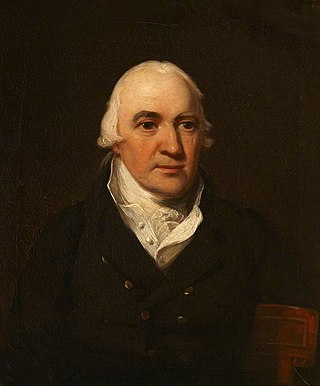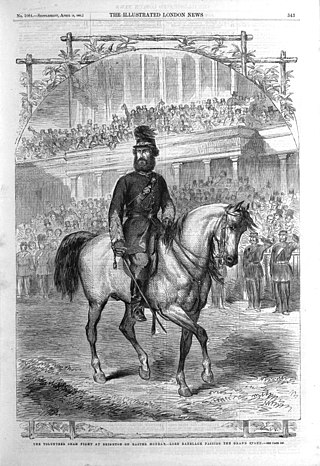Related Research Articles

Earl of Enniskillen is a title in the Peerage of Ireland. It was created in 1789 for William Cole, 1st Viscount Enniskillen. He had already been created Viscount Enniskillen in the Peerage of Ireland in 1776 and had inherited the title Baron Mountflorence, of Florence Court in the County of Fermanagh, which had been created in the Peerage of Ireland in 1760 for his father John Cole, who had earlier represented Enniskillen in the Irish House of Commons. The family are descended from the Ulster planter, Sir William Cole.
Arthur Chichester, 2nd Earl of Donegall, PC (Ire) was an Anglo-Irish politician and peer.

Edward Chichester, 1st Viscount Chichester was an English peer.

Henry Bayly-Paget, 1st Earl of Uxbridge, known as Henry Bayly until 1769 and as Lord Paget between 1769 and 1784, was a British peer.

Viscount Ranelagh was a title in the Peerage of Ireland. It was created on 25 August 1628 for Sir Roger Jones, son of Thomas Jones, Archbishop of Dublin and Lord Chancellor of Ireland. He was made Baron Jones of Navan, in the County of Meath, at the same time also in the Peerage of Ireland. Thomas Jones's father was Henry Jones, of Middleton in Lancashire. The first Viscount was succeeded by his eldest son, Arthur, the second Viscount, who represented Weobly in the English Parliament. Arthur was succeeded by his son, Richard, the third Viscount, who was created Earl of Ranelagh in the Peerage of Ireland in 1677. On Richard's death in 1712 the earldom became extinct while the barony and viscountcy became dormant.
Baron Ranelagh, of Ranelagh in the County of Wicklow, was a title in the Peerage of Ireland. It was created on 18 April 1715 for Sir Arthur Cole, 2nd Baronet, who had earlier represented Enniskillen and Roscommon in the Irish House of Commons. The Baronetcy, of Newland in the County of Dublin, was created in the Baronetage of Ireland in 1660 for his father Sir John Cole, 1st Baronet, a member of the Irish Parliament for County Fermanagh. He married Elizabeth Chichester, daughter of Lieutenant-Colonel John Chichester and the Honourable Mary Jones, daughter of Roger Jones, 1st Viscount Ranelagh, and aunt of Richard Jones, 1st Earl of Ranelagh. Lord Ranelagh was childless and the titles became extinct on his death in 1754.

John Henry Crichton, 4th Earl Erne,, styled Viscount Crichton from 1842 to 1885, was an Anglo-Irish peer and Conservative politician.
John Crichton, 3rd Earl Erne, KP, was an Anglo-Irish peer and politician.

William Willoughby Cole, 1st Earl of Enniskillen, styled The Honourable from 1760 to 1767, then known as the Lord Mountflorence to 1776 and as the Viscount Enniskillen to 1789, was an Irish peer and politician.
Sir Roger Jones, 1st Viscount RanelaghPC (Ire) was joint Lord President of Connaught with Charles Wilmot, 1st Viscount Wilmot. He commanded the government forces in Connaught during the Irish Rebellion of 1641 and the beginning of the Irish Confederate Wars defending Athlone against James Dillon until February 1643.
Sir William Parsons, 1st Baronet of Bellamont, PC (Ire), was known as a "land-hunter" expropriating land from owners whose titles were deemed defective. He also served as Surveyor General of Ireland and was an undertaker in several plantations. He governed Ireland as joint Lord Justice of Ireland from February 1640 to April 1643 during the Irish rebellion of 1641 and the beginning of the Irish Confederate War.
Sir Paul Davys was an Irish politician and civil servant, who held office as Clerk to the Privy Council of Ireland and later as Secretary of State (Ireland). He had considerable influence in public affairs, and enjoyed the close friendship of the Lord Lieutenant, James Butler, 1st Duke of Ormonde. His sons, William and John, both attained high office. He was the grandfather of Paul Davys, 1st Viscount Mount Cashell.
Arthur Cole, 1st Baron Ranelagh, known as Sir Arthur Cole, Bt, between c. 1691 and 1715, was an Irish politician.
The Custos Rotulorum of Fermanagh was the highest civil officer in County Fermanagh.
Henry Moore, 1st Earl of Drogheda PC (I) was an Anglo-Irish peer, politician and soldier.
Lt.-Col. Richard Magenis was an Anglo-Irish Unionist politician who sat in the Irish House of Commons and British House of Commons for Enniskillen.
Hon. Arthur Cole-Hamilton was an Anglo-Irish politician who sat in the Irish House of Commons for County Fermanagh and Enniskillen. After the Acts of Union 1800, he sat in British House of Commons for Enniskillen.
Hercules Langford Rowley PC was an Irish politician and landowner.
The Honourable Charles Moore, styledViscount Moore, was a Member of the Irish Parliament for Drogheda.
Henry Hamilton-Moore, 3rd Earl of Drogheda PC (Ire) was an Anglo-Irish peer and soldier.
References
- ↑ John Burke, A General and Heraldic Dictionary of the Peerages of England, Ireland, and Scotland, extinct, dormant, and in abeyance (Henry Colburn, 1846), p.652.